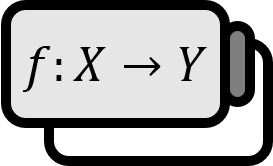Alternating Function
Definition
Let set $X$ be given. A function that satisfies the following is called an alternating function.
$$ \phi : \overbrace{X \times X \times \cdots \times X}^{n} \to \mathbb{R} \\ \phi (x_{1}, \dots, x_{i}, x_{i+1}, \dots, x_{n}) = - \phi (x_{1}, \dots, x_{i+1}, x_{i}, \dots, x_{n}) $$
Explanation
It is a function whose sign changes when two adjacent variables are swapped. Of course, it can also be shown that this holds true for variables that are not adjacent, according to the definition.
If there is at least one duplicate element among the variables, the value of the function is $0$.
Properties
$$ \begin{equation} \phi (x_{1}, \dots, x_{i}, \dots, x_{i+k}, \dots, x_{n}) = - \phi (x_{1}, \dots, x_{i+k}, \dots, x_{i}, \dots, x_{n}) \end{equation} $$
The necessary and sufficient condition for $\phi$ to be an alternating function is as follows.
$$ \begin{equation} \phi (x_{1}, \dots, x_{i}, x_{i}, \dots, x_{n}) = 0 \end{equation} $$
Proof
Proof (1)
$$ \begin{align*} & \phi (x_{1}, \dots, x_{i}, \dots, x_{i+k-1}, x_{i+k}, \dots, x_{n}) \\ =&\ - \phi (x_{1}, \dots, x_{i}, \dots, x_{i+k}, x_{i+k-1}, \dots, x_{n}) \\ =&\ (-1)^{2} \phi (x_{1}, \dots, x_{i}, \dots, x_{i+k}, x_{i+k-2}, x_{i+k-1}, \dots, x_{n}) \\ \vdots& \\ =&\ (-1)^{k} \phi (x_{1}, \dots, x_{i+k}, x_{i}, \dots, x_{i+k-2}, x_{i+k-1}, \dots, x_{n}) \\ =&\ (-1)^{k+1} \phi (x_{1}, \dots, x_{i+k}, x_{i+1} ,x_{i}, \dots, x_{i+k-2}, x_{i+k-1}, \dots, x_{n}) \\ \vdots& \\ =&\ (-1)^{k+(k-1)} \phi (x_{1}, \dots, x_{i+k}, \dots, x_{i+k-1}, x_{i}, \dots, x_{n}) \\ =&\ - \phi (x_{1}, \dots, x_{i+k}, \dots, x_{i+k-1}, x_{i}, \dots, x_{n}) \end{align*} $$
■
Proof (2)
$$ \begin{align*} && \phi (x_{1}, \dots, x_{i}, x_{i}, \dots, x_{n}) =&\ - \phi (x_{1}, \dots, x_{i}, x_{i}, \dots, x_{n}) \\ \iff && 2\phi (x_{1}, \dots, x_{i}, x_{i}, \dots, x_{n}) =&\ 0 \\ \iff && \phi (x_{1}, \dots, x_{i}, x_{i}, \dots, x_{n}) =&\ 0 \end{align*} $$
■
